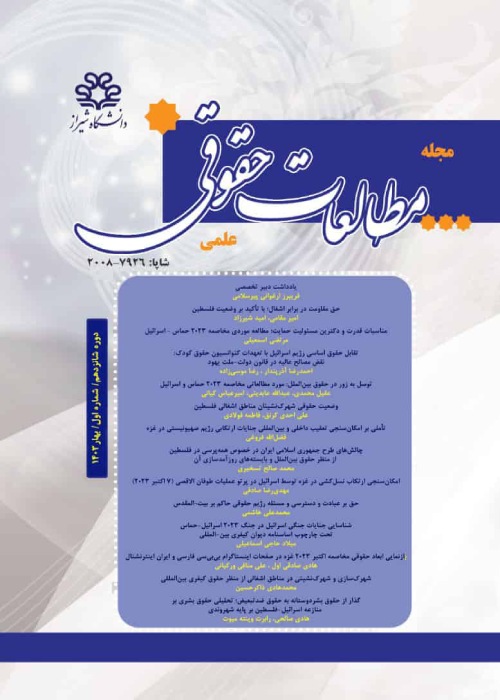Peaceful Defense: Formulation of Saadi's Theory of War Law
Author(s):
Article Type:
Research/Original Article (دارای رتبه معتبر)
Abstract:
The law of war, encompassing jus ad bellum and jus in bello, has been a subject of study within public international law. Theorists throughout history, such as Cicero, St. Augustine, Grotius, Kant, and Hegel, have contributed to the discourse on this topic. However, Iranian thinkers have been notably absent from this list. Can Saadi, a renowned Persian poet, and thinker, represent Iranian perspectives on the law of war? This research aims to identify and formulate Saadi's theory of war law as reflected in his works.The primary objective is to explore Saadi's theory of war law while acknowledging that it coexisted with Aquinas' just war theory during the same period. The secondary objectives include presenting an Islamic perspective on war and peace, as well as providing a brief overview of the contemporary law of armed conflict. The main question addressed is whether Saadi's works contain a discernible theory of war law. The research hypothesis proposes that Saadi's works, predominantly studied within the realm of Persian language and literature, have received limited attention from scholars in other disciplines such as sociology, law, and philosophy. Saadi, being a creative thinker, expressed his ideas eloquently in his writings, which have primarily been appreciated for their literary qualities. However, it is possible to identify Saadi's theory of war law by examining his prose and poetry. It should be noted that while this theory may not be directly applicable in the present day, it offers insights both from an antiquated perspective and as a potential source of inspiration for contemporary legal frameworks.The research methodology employs qualitative analysis through library research, content analysis, classification, and modeling of Saadi's viewpoints related to the law of war. The study avoids making broad assumptions about Saadi's overall philosophy and instead focuses solely on his perspectives on war and peace. The research takes a descriptive and non-evaluative approach, paying special attention to the historical context of Saadi's time.The findings reveal the existence of a scientific theory of war law within Saadi's works. Structurally, Saadi's theory may lack a coherent form, necessitating a comprehensive study of his voluminous writings rather than a verse-by-verse analysis. While the core of Saadi's theory of war law is found in the second chapter of Bostan, references to this subject can also be found in other parts of Golestan and Rasail.Substantively, Saadi presents a comprehensive theory of war law that is notable even in comparison to Aquinas' just war theory. The principles of Saadi's theory include: 1) prioritizing peace, 2) considering any means to avoid war as valid, 3) refraining from engaging in an unequal position, 4) recognizing the validity of peaceful defense, 5) preserving the dignity of individuals and civilian areas during war, 6) adopting strategies and tactics that minimize casualties while inflicting financial damage, 7) establishing an orderly military structure, 8) ensuring the existence of a well-organized military corps, 9) respecting hierarchy within the corps, and 10) acknowledging the rights and duties of military forces.Saadi approaches his theory pragmatically, aligning it with public interests. His theory is not solely influenced by Islamic or European ideas prevalent during his time but is rather a product of his lived experiences, sometimes conflicting with Islamic views and jurisprudence.In conclusion, Saadi's works contain a discernible theory of war law, affirming the research hypothesis. Saadi's contribution to the evolution of the law of armed conflict merits recognition, and it is incumbent upon Iranian and Persian legal scholars to acknowledge his ideas and position himappropriately among the esteemed theorists in this field. By shedding light on Saadi's theory of war law, Iranian and Persian lawyers can play a crucial role in highlighting his contributions and elevating his status within the field of legal theory.In summary, this research explores Saadi's theory of war law by delving into his writings. While acknowledging the coexistence of Aquinas' just war theory during the same period, this study focuses solely on Saadi's perspectives. The research methodology employs qualitative analysis and content classification to identify and formulate Saadi's theory. The findings reveal the existence of a scientific theory on the law of war within Saadi's works, with principles that encompass various aspects of war and peace. Saadi's theory is pragmatic and rooted in public interests, often differing from prevailing Islamic views and jurisprudence of his time. The research hypothesis is confirmed, affirming that Saadi has played a role in the development of the law of armed conflict. It is incumbent upon Iranian and Persian legal scholars to recognize Saadi's contributions and establish his rightful place among renowned theorists in this field.By extending our understanding of Saadi's theory of war law, we can enrich the discourse surrounding the law of armed conflict and draw insights from diverse cultural and historical perspectives.
Keywords:
Language:
Persian
Published:
Legal Studies, Volume:15 Issue: 2, 2023
Pages:
37 to 72
magiran.com/p2600480
دانلود و مطالعه متن این مقاله با یکی از روشهای زیر امکان پذیر است:
اشتراک شخصی
با عضویت و پرداخت آنلاین حق اشتراک یکساله به مبلغ 1,390,000ريال میتوانید 70 عنوان مطلب دانلود کنید!
اشتراک سازمانی
به کتابخانه دانشگاه یا محل کار خود پیشنهاد کنید تا اشتراک سازمانی این پایگاه را برای دسترسی نامحدود همه کاربران به متن مطالب تهیه نمایند!
توجه!
- حق عضویت دریافتی صرف حمایت از نشریات عضو و نگهداری، تکمیل و توسعه مگیران میشود.
- پرداخت حق اشتراک و دانلود مقالات اجازه بازنشر آن در سایر رسانههای چاپی و دیجیتال را به کاربر نمیدهد.
In order to view content subscription is required
Personal subscription
Subscribe magiran.com for 70 € euros via PayPal and download 70 articles during a year.
Organization subscription
Please contact us to subscribe your university or library for unlimited access!


